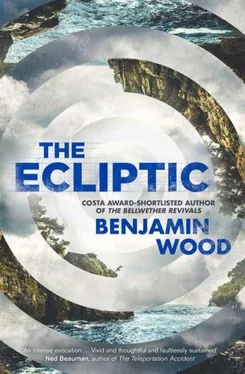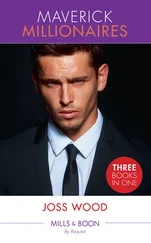‘Ah, Max. So many imperatives. I love the way you talk.’ Jim grinned, turning back for the main room. ‘I’m sorry, old pal, but you seem to be mistaking art for press-ups. I can’t just drop and give you twenty. I’m a painter. The inspiration comes, the inspiration goes.’ He raised his arms. ‘Are you hearing this, Ellie? This is what you can expect. It’s all a lot of dancing for the organ-grinder from now on.’
‘If you need another show of my good faith, that’s fine. How much?’ Eversholt reached into his jacket and pulled out a chequebook. I watched the whole thing happening without saying a word.
‘I’m not interested in your money,’ Jim said. ‘But you can make one of those out to someone else, if you don’t mind. Last name’s Conroy. First name’s Elspeth. Don’t ask me to spell it, ‘cause I’m pissed, but I reckon fifty pounds’ll be fair enough to begin with.’
Eversholt started writing the cheque. ‘Who the bloody hell is Elspeth Conroy?’
‘ She is,’ Jim said, pointing at me. ‘Artist-in-residence.’
Eversholt slowly pivoted his neck. ‘You did this?’
I hardly knew what to say. The blood rushed out of my head. My palms went very cool. ‘Yes. Well, it just sort of came together really. Bit of a fluke.’
‘Rubbish,’ Jim said. ‘She has more of them. Upstairs. Tons of them. They’re loads better than anything you’ll find in this dump.’
Eversholt tore off the cheque and shut the book. ‘Show me.’
‘More directives,’ Jim said. ‘You should really learn some manners.’
‘You’re right. Let me try that again.’ Until then, Eversholt had regarded me with the passing interest he might otherwise have afforded a chambermaid or a stable boy. Now I had his full attention. ‘Miss Conroy, darling ,’ he said, ‘if you’d let me take a quick look at your work, I’d be delighted. In the meantime—’ He came forward, offering the cheque. ‘Call this a down-payment on what I’ve seen so far.’

Within a few months, Max had organised a show at the Eversholt Gallery, in which a small selection of my canvases was presented in a hallway before the main exhibition. The headline attraction was Bernard Cale, a welterweight boxer turned artist, who had forged a good career making ink-and-gouache drawings of the fights. He was popular with male collectors at the time, as his pictures were brutal and unflinching, and there was a certain macho prestige to be gained from hanging a Bernie Cale in your study, all those exploding lips and broken noses to discuss over brandy and cigars. I respected the earnest themes of Cale’s pictures and admired the skill of their construction, so I was pleased to see my work displayed as an accompaniment to his. No one who attended the show arrived with the intention of seeing my gloomy bombsite paintings, but plenty stopped to look at them.
Jim turned up at the private viewing, mercifully sober. He stood smoking in the hallway with Bernie Cale himself, examining my favourite piece in the collection: Stage Ghost Rehearsal, 1958. It showed the shell of an old theatre in Kennington, upon which I had overlaid a new façade in thinned-out tones of grey; behind the pale windows, I had delicately painted the wraith of a man holding a straight-blade razor, his cheeks lathered in foam, and scratched the reflection of a young girl into his shaving mirror. ‘Bernie likes this one best,’ Jim said. ‘He thinks it’s menacing. I think it’s sad. Come and settle the argument.’
Cale nodded. ‘I want to know what that bloke is thinking. Can’t help but worry for the little ’un, I must say.’ He moved closer to the painting, blinking at it. ‘They all sort of do that, in their way — I was just telling Jim: they all make you feel some-thing — but this one puts me on edge. It’s hard to do that with a picture.’
‘Thank you, Bernie. That’s kind of you.’
‘What’re you thanking me for? I didn’t paint the bloody thing.’
‘Don’t leave us hanging,’ Jim said to me, stubbing out his cigarette. ‘Are we supposed to feel sad, frightened — what?’
I said, ‘It depends on who’s looking.’
‘Hear that, Bernie? It’s a draw.’
‘I want a refund,’ said Cale, smirking.
At the end of the evening, I found Jim waiting on the pavement outside. ‘Thought someone should walk you home,’ he said. ‘Unless you’ve got a limo coming.’
I was still living rent-free in the attic room in St John’s Wood, and I had given no thought to the prospect of finding my own studio. At Max’s urging, I was no longer ‘cheapening myself’ by working as an assistant, so I did not have the modest wages to sustain me. Instead, I withdrew funds daily from Max’s ‘down-payment’, half of which I had sent to my parents in Clydebank the moment his cheque cleared in my account. I felt, in that strange period, as though I was caught like a feather on a draught. It was clear that the course of my life depended on the outcome of the entrance hall show, but I could not tell in which direction it was going to propel me. ‘I was going to take the bus,’ I said.
We walked down Cork Street together. It was a windless night but the cold still pinched and I had not brought a coat. Jim saw that I was shivering and said, ‘A gentleman would probably offer you his blazer.’
‘He would.’
‘But then you’d know he’d burned his shirt twice with the iron. What the heck—’ He removed his jacket and I stopped so he could cast it round my shoulders. And, turning, he showed me the singe-marks on his back: two light brown impressions at the spine.
‘You had the heat too high.’
‘Well, I know that now .’
‘I appreciate the effort. You look very smart.’
He shrugged. ‘Warmer yet?’
‘A bit.’
We were at Baker Street before he said a word about the show. It was expressed almost in resignation. ‘That painting Bernie liked — the one with the bloke shaving — you’ve got something there. If I tried to paint a scene like that, I’d get the composition wrong. But you know exactly how much of the little girl’s face to show in the mirror. It’s got emotions in it most of us would shy away from.’
I found it hard to walk and feel such gladness all at once. ‘Thank you. It really means a lot to hear that, Jim.’
‘Look, I’m not saying they were all great. Don’t start leaping in the air.’ He swiped at his nose a few times with the crook of his wrist. ‘If the whole show was that good, I wouldn’t have stuck it out all night.’ He walked me halfway across the road, his hand on the small of my back. ‘Now you’d better hope nobody buys it, eh?’ A car slowed down for us and blinked its headlights. ‘At last, a decent citizen.’ He gave a thumbs-up to the driver as we passed by the bonnet.
‘What’s that supposed to mean?’ I said.
He was a few strides ahead of me now and had to stop. ‘Don’t stand about, I’m freezing,’ he said.
‘What did you mean by that?’
Traffic shone against his back. He blew into his fists. ‘Come to the pub with me,’ he said. ‘I’ll show you.’
‘No, I’ve already had too much to drink.’
‘I know. Two glasses is your limit. Just — wait a mo.’ And hanging an arm out into the road, he was able to flag an approaching cab. It pulled over with its window down. ‘Maida Vale, mate,’ Jim told the driver. ‘The Prince Alfred.’ He opened the door for me. ‘Come on then, or you won’t get your answer.’
When we reached the pub, he did not go straight up to the bar to get a whisky, as I expected him to. He steered me to the far end of the room instead, and called out to the landlord on his way: ‘I’ll start with a double, Ron. Leave it there for me.’
Читать дальше













